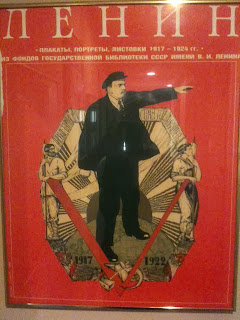 |
| Poster from Soviet era |
But there were strains.
When GSO David asked to be able to use the swimming pool, he was told there was an hourly fee, the equivalent of about $50. His response was that no hotel in the U.S. charged a fee to guests to use the swimming pool and in addition, their fee was entirely too high for one person to go swimming. The hotel's response was that the fee was for as many people as wanted to swim at the same time, not per person. I considered it an extension of the pattern I saw in Romania - no one dared ever do anything alone for fear of what others might think.
 |
| Poster from the Soviet era |
One of the reasons David told me the embassy leased the suites in the Codru was because the Hotel Sebaco wouldn't agree to lease us all of the suites they had. There were 8 suites, two on each floor. But the hotel management insisted that they needed to save some, that it wouldn't be appropriate for all of them to be used up at the same time. Those explanations didn't make a lot of sense, but that was nearly normal during our early days in Moldova.
The only reason the Hotel Codru didn't lease us all of their suites was that the Turkish ambassador was already living in one of them. The ambassador and David and Susan moved into two of the remaining three suites and made the third ready for us.
 |
| Poster from the Soviet era |
The Codru did not have a swimming pool. It did not had a casino. It was not as expensive as the Sebaco and it was two blocks closer to the embassy. We tried to convince temporary visitors to the embassy to stay at the Codru because it was predictable. It might be colder than we liked, but we considered it as the Warm Heart Hotel, reflecting the phrase cold hands, warm heart.
The Sebaco Hotel was the Cold Heart Hotel. It was warm, but we could never be sure what our temporary visitors would find there. For example, one of the Cleared American Guards (CAGs) reported that the toilet seat in his bathroom broke. The hotel replaced the seat and added the cost of the new seat to his bill. Another temporary visitor from Germany was told when he checked in that they didn't have a regular room as he requested. They offered him a junior suite instead, which he accepted. But when he checked out, he discovered he had been charged the higher rate for the junior suite. The hotel management wasn't willing to reduce his bill. The visitor couldn't understand why we hadn't warned him that he should confirm what the rate would be when he checked in. I tried to explain that even if we had, we couldn't be sure what other additional charges they might add. That was the point - the Sebaco was unpredictable.
 |
| Image of typical Moldovan handicrafts by migration museum |
The Codru did have a gift shop in the lobby. At first glance, it didn't appear to have much to offer, just handicrafts and trinkets. But when Dennis, a temporary communications specialist, bought several items to take back to the U.S. as gifts, we noticed that they wrapped up the items with old Soviet-era posters because they didn't have bags. We asked the woman at the desk if we could buy the posters. The look she gave us made it clear she couldn't think of a reason we would make such a request. She replied that she couldn't sell them to us, but she could give them to us. So she pulled out the stack of posters under the counter and several of us pulled out samples from them. A dozen or so now line the hallway leading to our guest bedroom.
No comments:
Post a Comment